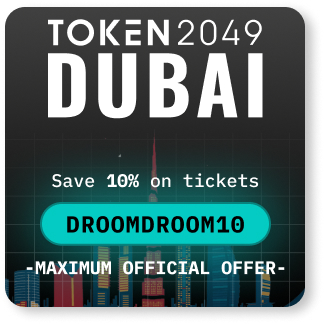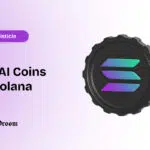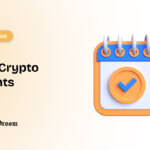As web enthusiasts, Developers, crypto investors or non-crypto investors, you must have read or heard about cryptocurrency and blockchain technology some time ago and you may have encountered people talking about crypto tokens. You might be wondering what these tokens are all about and know why they are different from cryptocurrencies like Bitcoin, Ethereum and so on.
- Understanding Crypto Tokens
- Different Between Coins And Tokens
- The Technology Behind Crypto Tokens
- Various Types Of Crypto Tokens
- Functions And Use Cases Of Crypto Tokens
- Examples Of Popular Projects Utilizing Crypto Tokens And Their Specific Use Cases
- Benefits Of Using Crypto Tokens In Various Industries
- The Drawbacks Of Using Crypto Tokens
- Tokenization Process
- How Does An Asset Get Tokenized
- Asset Sourcing
- Issuing And Owning Of Digital Asset
- Distribution And Trading
- Data Reconciliation And Servicing Of Assets
- Conclusion
Before we can go into the differences let us have a quick refresher on what cryptocurrencies are. Cryptocurrencies are digital currencies that users or people can exchange with goods and services that are similar to traditional currencies like dollars, pounds etc. They are decentralized, meaning that they are not governed by government institutions, unlike the traditional institutions. In cryptocurrencies like Bitcoin, or Altcoin, all transactions are done through blockchain technology, where a ledger facilitates the movements between the secure addresses. This movement of transactions is coins and tokens, which are both digital assets on the blockchain technology.
Crypto tokens are digital assets that have been tokenized on an existing cryptocurrency’s blockchain
Coins and tokens are different assets and one of the most significant differences is how they operate in the cryptocurrency blockchain. In this article, we will be talking about crypto tokens, their operation in the crypto market and their work. So, let’s read on to find out.
Understanding Crypto Tokens
Crypto tokens are assets that are tokenized on an existing cryptocurrency’s blockchain. In other words, it is a digital asset built on another cryptocurrency’s blockchain. They are used to raise funds for different projects and are usually distributed, sold, created and circulated through the initial coin offerings (ICOs) process, which involves crowdfunding. They can be used as investments for value storage or making purchases.
Different Between Coins And Tokens
You might be asking this question: are tokens different from cryptocurrencies like bitcoin or altcoin? Well, cryptocurrencies can be known as crypto coins but in a nutshell, they can either be tokens or coins depending on if their native cryptocurrency owns blockchain or not. Let me explain it a little further.
The crypto coin is a unit that is native to cryptocurrency’s blockchain which they are built on. For instance, Ethereum, a native blockchain is called Ether (ETH) and it’s considered a crypto coin due to being its blockchain. These coins use keys to indicate ownership of some cryptocurrency assets. They are used in our everyday transactions like online shopping or making transactions with any merchants available in your location, which can be sent your funds through the traditional account.
Crypto tokens operate on blockchain but are not native to blockchain which acts as a medium for the creation and execution of decentralized applications and smart contracts. It is used to facilitate transactions on the blockchain. For instance, several users used crypto tokens as an exchange on the Ethereum blockchain. In some cases, these tokens can go through an initial coin offering (ICO) and progress to another stage once the ICO is completed.
The Technology Behind Crypto Tokens
Mainly, the technology behind crypto tokens is blockchain and smart contracts. A blockchain is a digital ledger technology (DLT) that stores information linked in blocks. This information can either be transaction records or established programs that operate on the blockchain which can be called smart contracts. For instance, a transaction in cryptocurrency is confirmed when they are formed into a block and added to the blockchain. If a cryptocurrency does not have its blockchain and uses another cryptocurrency’s blockchain, it is considered a token.
For example, Ethereum is a blockchain and its own cryptocurrency’s blockchain is called Ether (ETH). But if these cryptocurrencies operate on the Ethereum blockchain instead of their own, which makes it a token. These tokens that are built on the Ethereum blockchain are ERC-20 tokens.
Various Types Of Crypto Tokens
There are several types of tokens available in cryptocurrency. They are as follows:
Security Tokens
These represent a particular investment like a share in a company, a voting right in a company or other centralized organization. Security tokens can be programmed with an unlimited array of unique characteristics and ownership rights when added as a digital representation of an asset or utility. With that, these tokens will constitute an entirely new type of digital asset. In a short word, security tokens are programmable crypto assets that secure the regulatory protections that are associated with traditional securities.
Utility Tokens
These represent access to a given product or service, especially on a specific blockchain network’s consensus mechanism, transaction fees paid, operations of a decentralized market being furnished and vote on new development within the decentralized autonomous organization (DAO) or other decentralized networks. Utility tokens are more focused on practical use compared to security tokens which are primarily used to establish ownership rights. In some cases, other crypto tokens that have launched through initial coin offerings (ICOs) on the Ethereum platform do intend to function as utility tokens.
Governance Tokens
This kind of tokenization is directed toward voting systems on the blockchain. Meaning, that they support blockchain-based voting systems since they are often used to signal support for proposed changes and to vote on new proposals. Governance tokenization allows a better decision-making process with decentralized protocols where all stakeholders can vote, debate, and collaborate fairly on-chain. For instance, a popular saving application issues out tokens to every individual which will allow them to vote on how to upgrade. The more tokens individuals get or receive, the more votes they will receive or get.
Platform Tokens
These tokens support a decentralized application (DApp) on a blockchain. For instance, Uniswap is an example of a decentralized application (DApp) which uses smart contracts to allow users to swap various Ethereum tokens with other Ethereum tokens. A token for Uniswap is known as a UNI token. Platform token benefits from the blockchain where they operate, gain increased security and the capability to support transactional activity.
Transactional Tokens
These tokens are used to transact which they serve as a unit of account and exchange for goods and services. These kinds of tokens function as traditional currencies like dollars or pounds but sometimes provide additional benefits. For example, Bitcoin, a decentralized cryptocurrency, can execute transactions without the use of intermediaries such as banking institutions. In addition to its function as a currency, DAI offers transactional performance to other networks and makes it faster and less expensive, such as XDai tokens, DAI-like transactional tokens ( also named POA network).
Functions And Use Cases Of Crypto Tokens
The major purposes or functionality within the cryptocurrency ecosystem using crypto tokens are as follows:
Access To Platform Through Token Payments
For you to have access to the blockchain platform, you must make payments to any network services. For example, a native cryptocurrency for the Ethereum blockchain is called Ether (ETH), which is the native token. To have your transaction validated and finalized by the Ethereum blockchain, you as an investor must pay for gas fees that are paid exclusively in ETH. It is also required to purchase more ETH tokens on the platform or in the secondary markets to pay for gas, as the Ethereum block can only contain a limited number of transactions.
Voting Right By Governance
Some other crypto projects issue governance tokens to create ownership structures. For instance, investors or individuals with their tokens like curve finance, can use them to vote or have the right to vote on proposals that change how crypto exchange works. So the governance tokens allow users or holders to directly vote on the proposal to change or upgrade the network itself. For you to have a strong voting power, your vote must be weighed by how many tokens you hold.
Asset Rewards Through Dividends
To generate value growth for native tokens must involve re-directing all of the fees paid by the users or investors to token holders. With that, an increase in network demand from paying users directly leads to a proportional increase in the revenue rewarded to token holders. Then issuing dividends can be done when all of the fees collected by the users are awarded directly to the token holders. These fees can be used to purchase the crypto tokens in the open market and distribute them to the token holders, thereby providing both appreciation of price through market purchase as well as dividends to token holders. For example, Sushiswap, and its native token is SUSHI.
Examples Of Popular Projects Utilizing Crypto Tokens And Their Specific Use Cases
Right here, we will mention five (5) major popular projects that utilize the crypto tokens with their use cases
MakerDao (MKR)
This maker compromises decentralized stable coins, collateral loans and community governance. This allows users and businesses to realize the advantages of their digital assets without experiencing volatility. The maker governance token for the DAI credit system is an MKR token and holding the MKR tokens, you must have responsibility for deciding the risk that will impact the future of the system. Remember that DAI is a stable and decentralized currency. The use cases of makerDao are the price stability in merchant transactions and also it is used for lending systems using collateral debt position, meaning, lending it through collateral debt position.
Binance Coin (BNB)
This is the global leading cryptocurrency exchange and has several uses, including paying for trading fees, in which you receive a discount of 25% using BNB, also travel exchange like traveling globally and making payments with BNB at travel merchants like Australia and a few countries. You can also use it to trade on stocks, stake and shift BNB through Mithril’s Vault wallet.
AAVE Liquidity
This facilitates peer-to-peer lending and has the potential to become one of the most valuable cryptocurrencies. It allows users to obtain loans in exchange for cryptocurrency and it is very fast when processing to receive the loans through AAVE.
Ethereum (ETH)
This is the most useful cryptocurrency and a blockchain platform that supports the execution of decentralized applications (DApps). Its use case is that it automatically executes the operations whenever certain terms and circumstances are met and satisfied without the need for intermediaries.
Axie Infinity
This is a strategy game that is based on utilizing NFT and blockchain technology to create a fun and action-packed experience. Axie Infinity is a play-to-earn game that allows users or gamers to play games and earn rewards. When you consistently contribute to the platform by stirring engagement, you will earn rewards in Axie Infinity Shard (AXS) tokens and Smooth Love Potion (SLP) tokens. But if you are not into the game, you can still buy the tokens from cryptocurrency exchanges.
Twitter quote on the recent project of tokenization
Benefits Of Using Crypto Tokens In Various Industries
Let’s look at the most powerful benefits of crypto tokens in various industries:
Enhanced Transparency And Provability
Users can easily trace their background and transaction history in a way verified in the cryptocurrency’s blockchain. Increased transparency is one of the main advantages the owner of digital tokens will enjoy. With these token assets, investors will receive contracts defining token attributes and ownership records. These contracts come with the rights and responsibilities a token holder is entitled to, such as knowing the identities of other traders on the platform. Enhancing transparency brought about by crypto tokens goes a long way in having trust among stakeholders.
Increased Liquidity
Once it is tokenized, your assets can be made available to a much bigger audience which will increase your market liquidity and remove the liquidity premium associated with your investment that was traditionally more difficult to sell like fine art or real estate.
Cost Reduction
In some cases, legal assistance and intermediaries between the sellers and buyers will be required if selling a high-value asset. You will be charged for these services but never come cheap. Blockchain will hold all your information that is related to tokenized assets which also eliminates the paperwork and this has allowed for efficiency in administrative procedures that are associated with asset sales, such as profit sharing which eventually can reduce costs. For instance, bond issuing costs in blockchain tokenization can be reduced by up to 90%, but fundraising costs have been reduced by 40%.
Immutability
This is an advantage as it allows users to keep track of their digital tokens, consumers will receive information about the issuers of their tokens and when it was created. Getting your clear history of tokens will boost your trust levels, thereby increasing the chance for you to trade. Meaning, that immutability ends traders’ fear of fraud, as they are assured that their tokens are traceable and returned to rightful owners in theft cases.
“Crypto tokens are changing the way people exchange property on the internet.-By Vann Vicente”
The Drawbacks Of Using Crypto Tokens
Regulatory And Legal Challenges
They can encounter regulatory challenges as governments around the world struggle to react to the remarkable nature of this new technology. These tokens can involve financial securities characteristics but might not be subjected to the same regulations just like traditional securities. This kind of challenge is for both government authorities and blockchain projects that are trying to balance their innovation and compliance
Technical Challenges
One of the technical challenges that all blockchain-based solutions are struggling with is creating a user experience that is streamlined and easy for everyday use. It is one of the conditions of the mass adoption of this technology. It must not be more complicated to use than the crowdfunding website if security tokens are targeting retail investors.
Security Vulnerability
Due to no regulations from the government, it can have the potential for cyber-attacks like hacking, fraud and so on, and also due to human errors in the system, it can cause loss or theft of crypto assets.
Tokenization Process

Let me briefly explain what tokenization is, tokenization is the process of transforming the ownership and rights of particular assets into a digital form. Meaning you can transform indivisible assets into tokens form. In other words, tokenization is the process of issuing a digital representation of an asset on a blockchain technology.
Now, let’s discuss the tokenization process step by step
- First, it will send the data of tokenization and authenticate the information to the tokenized system.
- But if the authentication fails and the data is delivered to an event management system, then the process will stop. As a result, the administrator can discover the issues and manage the system effectively and the system will move on to the next phase once the authentication is successful.
- A token will be generated and kept in a highly secure data vault when using one-way cryptographic techniques. Then the new token will be provided to the application for further use.
How Does An Asset Get Tokenized
Asset Sourcing
This process will require knowing if the asset can be treated as a security and which regulatory frameworks apply to
Issuing And Owning Of Digital Asset
Once the digital asset has a physical counterpart, then it must be moved to a secure facility that’s neutral to both. The token network and the compliance will be selected together to create a digital representation of the asset on blockchain technology.
Distribution And Trading
The consumer will have to set up a wallet to store their digital asset. This can depend on when a secondary trading venue may be created for the asset
Data Reconciliation And Servicing Of Assets
Once the consumer has the asset distributed to him, it will require ongoing maintenance. And that will include tax, regulatory, account reports and many more.
Conclusion
A crypto token is a digital asset that represents a unit of value and is built on a blockchain network, allowing various functionalities and use cases within decentralized applications including their benefits and challenges to look out for.




















